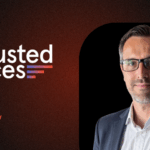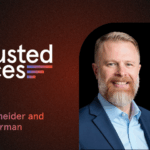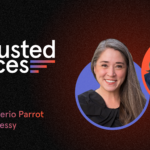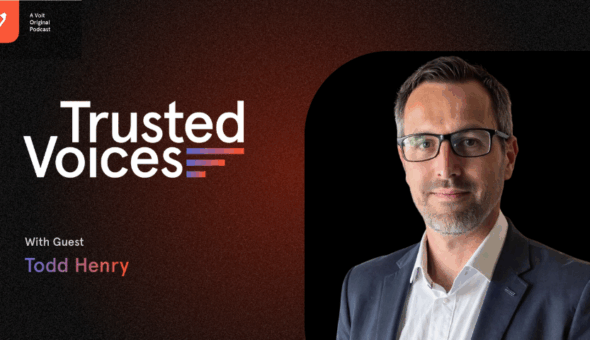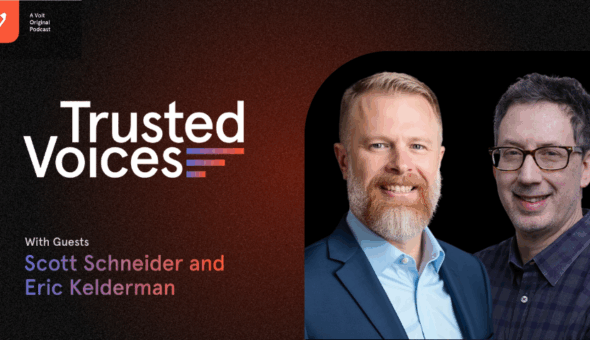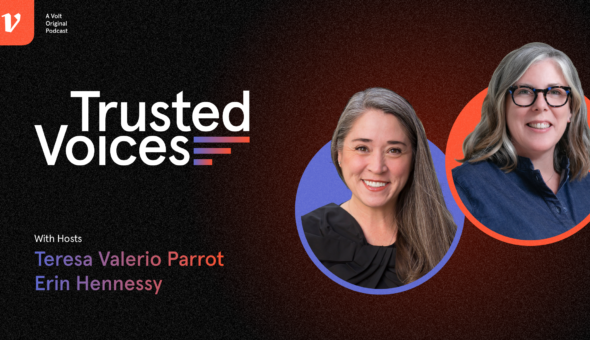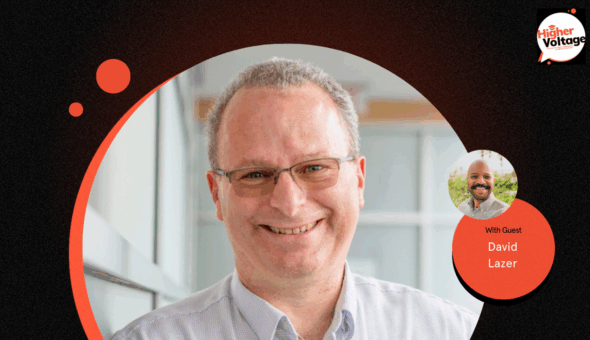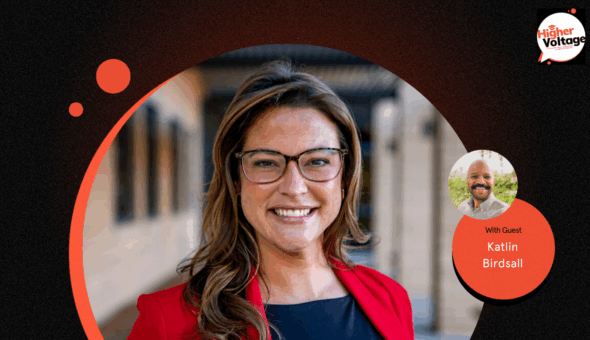This is my hill. I’m ready to fight.
In a moment that felt both inevitable and electric, Harvard finally said what many in higher education have been itching to scream: “We are worth defending.” Erin Hennessy and Teresa Valerio Parrot dig into what Harvard’s bold refusal to comply with new Trump administration pressures means for the Ivy Leagues and campuses nationwide.
The conversation pulls no punches. Erin is weary but resolute; Teresa is fiery and ready to fight. Both recognize Harvard’s move as a turning point. A high-profile institution is using its endowment and platform to push back on political overreach, particularly around research funding and international student visas.
But it’s not just about Harvard. Erin and Teresa spotlight Tufts, Georgetown Law, and Rutgers as institutions already paving the way for advocacy. And now, hopefully, more can follow under Harvard’s big umbrella. Still, the stakes are enormous: international students are losing visas over minor infractions, and institutional responses have varied from heartfelt outreach to strategic silence.
In between the policy and politics, Erin and Teresa reflect on their recent experience at the AGB conference, where discussions of governance, athletics, and trust in leadership were as diverse as the room itself. One standout moment: a panel featuring Saint Francis University and TCU highlighting how very different approaches to athletics can still reflect mission-driven governance.
The episode ends where it began: with a call to action. Whether it’s pushing back in the court of law or stepping into the court of public opinion, leaders are being asked to choose their moments, and choose them boldly.
As Teresa puts it: “Harvard gave the first no. Let’s make sure it’s not the last.”
Show Notes
- Harvard
- Trump Administration Issues
- ACE, AAU, APLU joint lawsuit challenging the decision to cap indirect cost rate for NIH grants and its permanent nationwide injunction
- International Student Visas Revoked
- AAUP v Rubio and amicus brief filings
- University Declaration for Rumeysa Ozturk (Tufts)
- These Faculty Senates are Trying to Band Together to Stand up to Trump
- Attendance at AGB
Read the full transcript here
Erin Hennessy
Hello and welcome to the Trusted Voices Podcast. I'm Erin Hennessy alongside Teresa Valerio Parrot, and in each episode, we discuss the latest news and biggest issues facing higher education leaders through a communications lens. For these conversations, we're often joined by a guest who shares their own experiences and perspectives, but we also make time for one-on-one conversations about what we're seeing, hearing and thinking.
Hello, Teresa!
Teresa Valerio Parrot
Erin, it feels so good to be back. I've missed you.
Erin Hennessy
And I you, although just, you know, for accuracy sake, we do communicate in some way almost every day.
Teresa Valerio Parrot
Correct.
Erin Hennessy
But face to face…
Teresa Valerio Parrot
Yes, and I have been so excited for this recording, because I'm ready, Erin. I'm ready for a fight.
Erin Hennessy
Okay. With me?
Teresa Valerio Parrot
No! You know I have been waiting for this moment.
Erin Hennessy
I don't I don't have it in me today. I feel like you and I are coming to this recording from two different sides of the same coin, and I…I am tired. I'm tired.
Teresa Valerio Parrot
I know. And you know, I have been waiting for this.
Erin Hennessy
Yeah.
Teresa Valerio Parrot
And I think people will predict exactly where each of us is coming from.
Erin Hennessy
Well, and I think we've both been waiting for this, and in just a second, we'll tell you what this is.
Teresa Valerio Parrot
Yes.
Erin Hennessy
I think we've both been waiting for it, and I don't know if it came too late for me. I don't know. Anyway, set it up and we'll dig in.
Teresa Valerio Parrot
Yes. So I would say for years, maybe, I've been waiting for this, but really since January, 20, and especially over the last couple of months, you and I have been saying, When does higher education get the fortitude to push back and say we are worth defending, and we are especially worth some institution, someone, something, wherever it comes from, a push that says, Trump administration, we aren't going to just capitulate. We are going to say enough is enough. And that happened on Monday at Harvard, and I'm ready for the fight, and I have been very vocal this week, saying enough is enough, and Harvard has given the first No. And as an industry, let's rally behind Harvard. And I'm not the only one, you know this. There are other institutions, there are other organizations, there are other individuals who are saying, We're behind you. Let's do this and we understand what the stakes are in higher education is worth it.
Erin Hennessy
Yeah, and it does feel like it's been building over the last couple of weeks…
Teresa Valerio Parrot
Correct.
Erin Hennessy
…and I was pleased to see that Dominique Baker on whom I have, I don't know, your phrase is professional crush, but whom I admire a great deal, posted on Bluesky, I guess it was yesterday, and very helpfully reminded everybody, after President Obama came out and gave Harvard credit for standing up and pushing back, she mentioned that other institutions, and other segments of institutions have been heading us in this direction.
Teresa Valerio Parrot
Correct
Erin Hennessy
And she mentioned specifically, Wesleyan.
Teresa Valerio Parrot
Yes
Erin Hennessy
She mentioned the dean of Georgetown Law, who pushed back on the interim US Attorney for the District of Columbia, the Rutgers Faculty Senate. And I thought it was important…
Teresa Valerio Parrot
And Tufts. Tufts did this, yes.
Erin Hennessy
Yes, several institutions have sort of led us to this path. But, you know, we always joke about when Harvard sneezes, higher education catches a cold, and this is one that I very much hope higher education catches. I mean, when Harvard does something, it gets Harvard sized attention for better or for worse. And so, yes, I was thinking about it this morning. It's like the parallel to Hanks-Wilson in the COVID pandemic, when Tom Hanks and Rita Wilson got COVID, and everybody went, oh shit, this is actually happening. And I think Harvard is that parallel moment that really crystallized little bits and pieces of action here and there, but brought it to a much higher and new level.
Teresa Valerio Parrot
But I think there's something so critically important about Harvard taking a stand in the way that it did. Because the reality is there needed to be a brand and a endowment the size of Harvard's that said no to what they said no to.
Erin Hennessy
Yes.
Teresa Valerio Parrot
What they, in essence, are doing is saying, we are not going to allow you to take over our institution and dictate for us what our programming in our curricula become, and we are not going to allow you to dictate our institution's future in some ways that you are doing at Columbia. And that is the kind of move that higher education has been waiting for. And so I have had the great luxury this week of talking to the Chronicle into the Wall Street Journal, and I mentioned just as Dominique did. And I'm very pleased to say that I studied at SMU, which at the time Dominique was a professor at, and have great respect for her as well. And when I talk to these two reporters at the Wall Street Journal and at the Chron, one of the things that I mentioned is we've seen this push back at other institutions. And I did not name and out other leaders who have taken very bold steps, because they have done so at their institutions in ways that they haven't wanted to be in the crosshairs for the administration because they needed an institution like Harvard to come out and say, we have the endowment and the brand that can withstand this kind of scrutiny from Trump, and we can have the luxury of a student recruitment pool that we don't have to worry about what happens on May 1. We can pivot our website. Where everybody else's websites are right now in enrollment season, we can go ahead and pivot that to really look at what is our research impact, and who are our faculty who are making a difference, and we can really have an audience of the Trump administration to push back on this narrative that they're pushing, rather than try to bring in a class right now. They can really have this really bold moment, and they can really say we are Harvard. We have the funding, the brand and the enrollment strength to take this on in a different way than most institutions. And good for them. And that provides this umbrella of coverage for other institutions to take on the piece that they're able to take on, that allows them to do the pushback in the ways that they can take on. And we needed that kind of an institution to have a bold step, and that gives the cover and the push for others to take on what they can do. And so let's do it.
Erin Hennessy
Yeah, and you know, Chris Eisgruber at Princeton, because I always have to bring New Jersey into it has been doing this work for weeks alongside Michael Roth and others, but following the Harvard statement and letter to the administration, stepped forward and said, we're there to Columbia. Oddly, I thought, issued their statement at 12:05am saying Yes, yes, of course, we would never allow anyone to tell us what to do. Which…interesting. Several interesting layers there, but it is…
Teresa Valerio Parrot
And on Columbia, I want to give a postscript to that. They had a PS that said, also, please give to help our international students. And there was a fundraising link at the end of that. It was an ironic postscript that was curious to me.
Erin Hennessy
Yes, it kind of felt like when Mario Batali apologized for being a terrible person and then gave you a pizza dough cinnamon roll recipe.
Teresa Valerio Parrot
Yeah, the cinnamon roll recipe! Which I've never made because I just couldn't get myself to use that recipe.
Erin Hennessy
Yeah…
Teresa Valerio Parrot
I would give to Harvard. And there have been many people who now have been giving to Harvard because they have money, don't get me wrong, but this is going to be expensive for them. They are going to have a legal battle ahead of them. And honestly, I would contribute to that. Put up a GoFundMe, and today, I would give to that, because you are defending the future of higher education, and absolutely, and I would contribute the little extra money to support GoFundMe for that, because honestly, this is the future of our industry.
Erin Hennessy
My friend.
Teresa Valerio Parrot
Yes?
Erin Hennessy
The day Harvard starts using GoFundMe, I uh…
Teresa Valerio Parrot
You know what, though?
Erin Hennessy
I'm gonna have to sit with that.
Teresa Valerio Parrot
I will 100% contribute to that.
Erin Hennessy
I know.
Teresa Valerio Parrot
Because it is the future of this industry, and I am here for it.
Erin Hennessy
Yeah? I mean, yes to all of these things, right? But I also, and I, and I'm not trying to be that…
Teresa Valerio Parrot
And also I'll give to the community college and to the regional comprehensive and to everybody else, because we need the defense of the industry.
Erin Hennessy
Yes, we do, and it's important. And there's all these people in the world that we live in suddenly going, Oh, well, maybe now Harvard isn't the worst of the worst. Because last week, people were absolutely, you know, dragging Harvard for this, that and the other. It will be interesting a year from now to look back or five years from now, to look back at the span of time that starts with Claudine Gay being inaugurated and running through, I don't know, a year from now, two years from now, to just look at what’s strategy, what's circumstance, sort of how Harvard comes out of this very difficult set of circumstances, some of which are self-inflicted, some of which were not. It'll be really interesting to read the book. And I'm hoping that someone is writing it. One of my favorite higher ed books is about Harvard, called Harvard Rules, and it was written about Larry Summers presidency, which whew buddy. It's a great read. It's one of my favorite higher ed books. I highly recommend it. I wish I knew the author off the top of my head, but we'll link it in the show notes. It'll be really interesting to look at which had a bigger impact in the Harvard reputation. It was it the Claudine Gay? Was it the protests? What, was it this move? You're absolutely right. You need a Harvard who can say sort of DGAF, and I know I already swore, so we're already marked explicit, but to your point, we have the ability, we have enough of a margin in how we do business that we can take some bold steps that other people can't take. And I appreciate that, and I'm thrilled that that enables other institutions to step in and do it. And maybe this is the moment where we finally see higher ed figuring out how to push back, how to stand up. You know, it's interesting to watch the associations shift. I think you were on the ACE webinar yesterday?
Teresa Valerio Parrot
Yes
Erin Hennessy
Which will be, you know, a week ago by the time this drops. And I was just so struck by the shift in tone. Not that that ACE the folks there haven't understood the seriousness of what we're going through, but yesterday, they just all looked really rocked by all of the things that are going on. And it's fascinating to see the ripples that are going to come from this Harvard decision and who else gets in line. But it's also terrifying to think about what the next step is going to be on the part of the administration.
Teresa Valerio Parrot
Well, it's been interesting for me, and I have a piece today in Inside Higher Ed where I talk about the first round of all of this probably, necessarily, was very much in the court of law, and ACE took the lead. They were obviously filing lawsuits challenging the decision to cap indirect cost rates for NIH grants, and they were granted a permanent nationwide injunction. We definitely saw the filing of paperwork, right? We saw things like AAUP v. Rubio, right, and this is about international student visas being revoked. So there was a lot of paperwork being filed. The initial pushback on the Trump administration, rightfully so and necessarily, and we could all predict this, was going to be in the court of law. But what I appreciated about how there is this shift, and I think this is why you saw the reaction that you saw on the ACE webinar, is that this took the fight into the court of public opinion. Harvard moved this into the court of public opinion. And my piece is about how I think they did this pretty well, and it's a first step. I think there's more to do, but this is the first step. And part of the reason why I think that ACE was a little bit gobsmacked in this webinar is because once you move it into the court of public opinion, you lose some of the control, right? It's not just on paper, and it's not something that you can button up as tightly, and that means that there's more work for all of us to do once it's in the court of public opinion. And that's where I think this gets a little bit messier. It's not just about how many filings do you have and briefs do you have in support of what you've done. So you can't just tidily say you have 86 briefings in support of what you're doing. Now it's about the retail therapy of going out to people and getting real support from real humans and community members for what you're doing. And it's not just about docket briefings, right? Like this is about how people feel, and that's where the rubber hits the road.
Campus Docket Ad Read
Student deportations, suspended research grants, penalizations for DEI initiatives, and that’s just this week. These and a whole raft of other legal questions and challenges are redefining higher education every day. That’s where our new podcast, Campus Dockett, comes in. I’m Scott Schneider, an attorney, an adjunct professor at the University of Texas School of Law, and in every episode of Campus Dockett, I’ll be joined by Eric Kelderman, senior writer at the Chronicle of Higher Education, to break down the latest legal issues that higher ed leaders need to know about. From slashed funding to rules regarding NIL and student athletics, and everything in between. Tune in to Campus Dockett, part of the Volt podcast network, as we help you navigate higher ed’s thorny legal issues.
Erin Hennessy
The one other thing that I want to throw out there before we move on to other topics is there was so much brouhaha about Harvard not starting a search for a permanent president and, you know, having Garber in there as an interim president. And why aren't we moving ahead and turmoil, we need a permanent president. I don't think a permanent president could have done this.
Teresa Valerio Parrot
No.
Erin Hennessy
And we talk all the time about interim presidents or presidents at the end of their tenure, doing the hard stuff that is going to set up the next president for success, and being willing to expend whatever capital you've got, or be comfortable not being beloved by this institution, because you need to set the next president up for success. And I think this absolutely does that. I don't know that Harvard's gonna do a search anytime soon.
Teresa Valerio Parrot
Right.
Erin Hennessy
Garber's had the interim title removed, so, you know, he's in the job. But I think if they had done, if Harvard Corporation had done a big search and found some fabulous person and put them in this job, they would not have the political capital, probably the backing of the board yet to say, I'm going to go light a fire under the Trump administration. And so I think again, you know, thinking about circumstances, I don't think this was strategy you know, a year and a half ago when the corporation made this decision, but it is a nice alignment of circumstances that Alan Garber has the leeway and the board support to go ahead and take this very, very bold stand.
Teresa Valerio Parrot
Well and I think that what you're also touching on we're seeing written right now in the Chronicle of Higher Education. So Lee Gardner is talking about this continually. He's talking about trust, but he's also talking about this tension that we're seeing between administrators and faculty. Where does that stand right now? So he's written a couple of pieces about this, and he recently was on Jack Stripling podcast, talking about exactly that we're seeing these tensions continually around faculty and administration relationships. Where do they stand and how do you build that trust? How do you maintain it, and why is it at this interesting crossroads right now? So to your point, you're right. Interims are being used in different ways right now, for real reasons, and this is a fantastic example of why and how. So if you haven't read his pieces, if you haven't listened to the podcast, highly encourage it. He's someone that I talk to quite often about exactly what this tension is and how these roles are being used in very strategic ways by administrations and also for change and for change management, both of those things. And this is a fantastic example of how you use positions strategically. And I want to give a really quick shout out to the Harvard team, because I mentioned it earlier, but I want to mention it again: It is no small feat to shift a website for an institution. This is pivoting a cruise ship on a dime, to change an institution's website so fundamentally that quickly, to absolutely pivot a narrative the way that they have done and it was done beautifully. So if any institution out there wants to go and see how you talk about research impact and you truly highlight your faculty for what they do, who they are, what they do, and why the Harvard website right now is chef's kiss, please go look harvard.edu.
Erin Hennessy
Yeah. And when we talk about, you know, the storytelling challenges…
Teresa Valerio Parrot
Yeah.
Erin Hennessy
Get out of the way and let the work speak for itself.
Teresa Valerio Parrot
Agreed.
Erin Hennessy
You know? We can put all the damn bells and whistles on it, but at the end of the day, the TikTok account isn't going to save you. Just get out of the way and let the work speak for itself.
Teresa Valerio Parrot
Yeah. Erin, did you want to talk about our students? Our students? No?
Erin Hennessy
I don’t want to talk about anything. I want to curl up in a ball in the bottom of my closet. But yes, I want to talk about our students. And I'm furious and heartbroken and…
Teresa Valerio Parrot
I'm pissed.
Erin Hennessy
…I definitely want to give a ton of credit to Ashley Mowreader at Inside Higher Ed. Yes, did I just call it the Inside Higher Ed?
Teresa Valerio Parrot
The! Why don't you call it the Inside Higher Education?
Erin Hennessy
Yes!
Teresa Valerio Parrot
Because that would only be the perfect way to describe it.
Erin Hennessy
The Inside Higher Education magazine. Anywho, Ashley and Inside Higher Ed have published a map, and I posted on LinkedIn the other day that this is a tab I have had open on my browser since it published. It is a map that pulls together, attempts to pull together all of the information that's currently publicly accessible and has been reported either by institutions or news outlets around the revocation and change in status for students who are international, students who are here on visas. And very early on, the storyline that was out there was all about students who had some engagement in protest, whether that was actually participating in a protest, or liking or sharing social media posts that appear to support protest against Israel in particular, but it has since shifted where we are now hearing stories from institutions about students from all kinds of countries, nowhere near the Middle East, nowhere near Israel or Gaza, who are in this country, who are weeks from graduating, some of them, and who are being identified for visa revocation, for things like going to court to try and negotiate down the fine for a speeding ticket or for an underage drinking ticket, for things that have nothing to do with what Secretary of State Rubio has called negative impacts on our foreign policy. This is horrifying. It is demoralizing. It is…
Teresa Valerio Parrot
It’s what was so common in college. If we start targeting those who get a minor in possession ticket, then, I'm sorry if you were to do that, think back to most college experiences and there but by the grace of God, go almost everybody that I went to college with.
Erin Hennessy
Present company, excluded. Right? You were an angel.
Teresa Valerio Parrot
Mel and Rose Valerio, cover your ears. Let's just, let's just move on to the next topic.
Erin Hennessy
Yeah, but what's really been difficult for me to stomach, and it sort of aligns with our earlier conversation about Harvard, is that I see institutions doing what we always tell them to do, which is reaching out and engaging with their international students, providing resources, connecting them with resources, making arrangements for students who are two weeks from graduation to complete their studies so that they can get their degree. But at some point, I don't know, maybe I'm naive, but I feel like we need to light it up, because this is unacceptable.
Teresa Valerio Parrot
There are our students.
Both
These are our students.
Teresa Valerio Parrot
They have paid tuition. They are part of our communities. We will claim them as alumni.
Erin Hennessy
We brag about our percentages of international students on our campus, and let me tell you, you're about to see that number drop to a point where we can't brag about it anymore, because I wouldn't send my kid here.
Teresa Valerio Parrot
We brag about how they raise our student profiles when they enter yes.
Erin Hennessy
Yes, and we talk about wanting to keep these students in the country so that our economy, our industries, can benefit from their training, their talent, their external perspectives, all of those things. I don't know. Again, maybe I'm just done in this week, but where's the video of a president standing between a student and an ICE officer?
Teresa Valerio Parrot
I do want to give kudos to the Tufts president for the way that Tufts has talked about this. I want to give them credit for their boldness in communication about this. Tufts, I think, has led in this front.
Erin Hennessy
Yeah, yes.
Teresa Valerio Parrot
So I do want to mention that. And we will have the statement from Tufts in our show notes, because I think that is communication that I would very much like to highlight.
Erin Hennessy
Yes.
Teresa Valerio Parrot
And I do want to, to your point, give kudos to Ashley for her coverage. I have sent this tracker to many people, and when the numbers were at 300 students, I sent this to many people, and I said this number is going to go up, and we need to watch this. Because I knew, based on who she was including, that this was the tip of the iceberg, unfortunately. And that number is well over 1000 and I still think we are at the tip of the iceberg, unfortunately.
Erin Hennessy
Yeah, and it's vastly underrated. I know of at least one institution, and I think you do as well. That isn't on that map, but I know…yeah, it's a vast under reporting. And again, super proud. I've seen some communications from presidents that have very smartly, you know, reached directly to the international student audience, reached to faculty and staff to let them know we're on this. Please be flexible, supportive. If there are people that are experiencing challenges that we don't know about centrally, please let us know. And it's been you know exactly on target, exactly what we would advise, but I don't know. I'm waiting for the Harvard in this, and Tufts may be it. I mean…
Teresa Valerio Parrot
I think Tufts is it.
Erin Hennessy
Let's see how it continues to unfold. But at some point the industry, as a whole, needs to stand up and say, This is unacceptable.
Teresa Valerio Parrot
I do have to give credit to one of my presidents. They had a number of people on campus who were saying, Why aren't you saying anything publicly? Why aren't you sending a statement to campus? Why aren't you telling us what international students should be doing? Basically, they were being asked to send something to campus that would be, I would say, performative. And so for each of those people who are asking for these comments, they reached out individually to those people, and they said, by me sending something to the campus community as a whole, I am identifying for our campus that we have students who would be vulnerable, and I am outing our students. So what I need you to know is I am reaching out to these students individually. I am making sure they have the resources that they need, and I am doing the work with those who need the work done. But I am not going to be doing something that would make them vulnerable. So they are not doing performative work. They are doing the work with those who need support, and that I think is critically important. So just because you don't see something doesn't mean that work isn't being done, and that I think is critically important right now.
Erin Hennessy
Yeah, I mean yes and no, I don't know. I know that I'm going back on episodes upon episodes of tape where I've said exactly the opposite. But as regular listeners know, I'm an adjunct faculty member, and I am really surprised that I have heard nothing from my institution. This isn't about a student, but about a scholar who is affiliated with my institution who was detained, and we heard nothing.
Teresa Valerio Parrot
Oh, if there's somebody detained, I think that's different. This is an institution that does not have anybody detained. This is an institution that is trying to fly under the radar right now and is reaching out to those on their campus specifically. And there are some who are looking for, I think, public statements, when instead for them, they need to fly under the radar.
Erin Hennessy
Yeah.
Teresa Valerio Parrot
The reality is, and I just said fight, right? But there are certain times when you stay quiet, and there are other times when you fight, right? And we talked about this before, you're damned if you do, and you're damned if you don't, so choose your damning wisely, and that's critically important calculus. So if you have somebody detained, fight. That's a fight. If you are trying to protect people and you're trying to fly under the radar. Fly under the radar. All of those have calculations.
Erin Hennessy
Yes, they do.
Teresa Valerio Parrot
All of them.
Erin Hennessy
They do. And I guess on some level for me, and this is where my head is on Wednesday, when I didn't sleep well last night, and I'm tired of all the shenanigans, and my patience is wearing very thin in so many sectors of my life. But I guess on some level, I hear your point about not making people vulnerable, but in a moment where it feels like everybody's vulnerable, I don't know. It's just hitting me different today.
Teresa Valerio Parrot
If it’s performative, though. I don't get it.
Erin Hennessy
Yes and no. I mean, I think there's a way to message it where you say, we're aware, we understand this is nervous making for everybody, particularly for students, you know, students across the country who are in this position where they're afraid about their own fate and future, and I don't know. I think there's a way to get there. I think there's a way to get there.
Teresa Valerio Parrot
I don't know, I think if you're outing somebody that doesn't need to be outed, what are you doing?
Erin Hennessy
But how are you outing somebody? I mean, the government already knows you've got foreign students, and they don't give a damn, right? We can agree to disagree, and every institution is different, and every institution is working under a different set of circumstances that externally, we don't know about even internally, students and faculty and staff don't know all the ins and outs, and that's fine. I just think there are some moments where I'd rather see somebody try. I don't know. I don’t know. I'm in a weird headspace.
Teresa Valerio Parrot
Yeah, and I think there are realities where there are nuances. And this goes back to COVID, and we saw this quite often in COVID, there is a difference between need to know and want to know. And we're in that space right now where sometimes what people want through communications and what they need are very different things. And sometimes when people say they want communications, sometimes it's a curiosity, and other times there is a need, and so we need to balance those, right?
Erin Hennessy
Yeah, well and it goes back to the, look at this we're bringing it full circle, it goes back to the conversation about trust
Teresa Valerio Parrot
Right. Right!
Erin Hennessy
If you have been a leader who has built trust with your organization, and people have experiences with you where they can say, this is a leader who I know is sensitive to these things, who is student focused, who is committed to protecting the institution and all of its people, then maybe I'm going to give that person the benefit of the doubt and assume something is happening that I can't see, that I don't know about, and that's fine, and that trust is very important there, and that further, second full circle moment, maybe our third, goes back to the interim presidency question as well.
Teresa Valerio Parrot
Right. Well, and it also reminds us that we don't always need a statement. As I mentioned, this was one on one communications with those who were asking. So again, let's remind everybody not everything needs a statement
Erin Hennessy
That's right.
AMA Symposium Ad Read
Want to help shape the future of higher ed marketing and communications? Now is your chance. Reputation, revenue, higher ed marketers have been asked to deliver both, and the pressure is on. As budgets tighten and public trust gets tested, teams are expected to do it all: protect the brand and bring in the dollars. The AMA Symposium for the Marketing of Higher Education is where we take that challenge head on. The 2025 call for proposals is open, and this year is all about bold strategies for growth. Got an idea that moves the needle? Proposals are due May 5. For new or seasoned leaders, this is where big ideas take the stage. Show us how you're building brands, driving revenue, protecting image and reputation, growing teams and shaking things up. Stand up. Stand Out. Learn more at ama.org/he.
Teresa Valerio Parrot
Can I shift so completely far away from all of this? Can I talk about a conference that we both were recently at?
Erin Hennessy
Yes.
Teresa Valerio Parrot
We both were recently at the Association of Governing Boards.
Erin Hennessy
We were in the lovely city of Chicago.
Teresa Valerio Parrot
Yes.
Erin Hennessy
Which I always enjoy, and it was great. One of the things, and I've said this, I swear, my father is just taken over this week, because I keep saying the same thing to people about this conference. It was such a diverse set of attendees…
Teresa Valerio Parrot
Yes!
Erin Hennessy
…in terms of sector, in terms of size, in terms of control, admission, but also in terms of race, ethnicity and gender. It was such a diverse group of people, and it really struck me, since we're now in conference season, that this was a very diverse room I was sitting in in all of these sessions.
Teresa Valerio Parrot
I loved it, and I also loved the range of questions that we received and we heard, and just being in with a group of people who were wanting to see who was going to step up and start to ask some of these tough questions, and the want of trustees to have some boldness. But it was fascinating to see that they didn't quite understand that they were responsible for leading that charge, and we all kind of walked away, those of us who were consultants or from associations walked away and kind of huddled and said, they get that they lead this charge, right? That was kind of interesting.
Erin Hennessy
Yeah, it was a great conference, and it couldn't have been better timed in terms of questions about governance, questions about how we continue to lead institutions in these moments, questions about how we hire and hold accountable leadership for these institutions. It was a really good conference. I particularly enjoyed, here we go, two sessions, and this is the Teresa Parrot, happy sunshine portion of the podcast, Teresa led a panel, moderated a panel with two client institutions talking about athletics and whither goest, all of it, and I'll let you talk about that in a second. But there was a second panel led by another one of our clients, NACUBO had a great panel with a board chair and a chief business officer talking about that relationship and how to strategically manage financial resources. That was fantastic as well. But I will let you talk about your fabulous panel with the folks from St. Francis and from TCU.
Teresa Valerio Parrot
Thank you. So we talked about athletic governance, and specifically the relationship between presidents and boards as they align athletics with mission. And I was really excited to be there with St. Francis the week before they had announced that they were transitioning from Division I to Division III. So we'll drop a link to the St. Francis transition website in the show notes. If you don't know of St. Francis, just the week before that, their basketball team was in March Madness, and their board had already voted on this big change. I was able to work with them on the governance decision over the previous year. It was a really tough decision for them, and I worked with them through all of the communications and the rollout, including an op-ed from their president that was in the Washington Post about the rationale for the decision. So they are a university that has 2,000 students. Of that, 40% of their students are Division I student athletes, and why they decided to make this move. So it was an honor to facilitate the discussion with TCU, who is all in on D1 athletics, one of the four pillars in their strategic plan is athletics. And to talk to St. Francis about why they're moving to D3 and why this is aligned with their mission. So two very different institutions in different trajectories tied to inner collegiate athletics, and it was really, really fascinating to see that there is this through line, that they actually are very much on the same page with why they're going in these directions. It was a cool conversation, and I was honored to be up there with Fr. Malachi and Fr. Gregory, who were there in your cassocks and talking about where they see athletics going in the future for their institution. Really cool conversation.
Erin Hennessy
Yeah, and I was thrilled to be able to tell Fr. Malachi that the very best teacher I had in K-12, who is just one of those teachers who changes lives, changed lives, is of St. Francis grad, and always told us about her time in Loretto, Pennsylvania.
Teresa Valerio Parrot
Yes.
Erin Hennessy
So, I got to share that little snippet about Patty Kolodi, my high school US AP history teacher. So.
Teresa Valerio Parrot
Excellent.
Erin Hennessy
The other thing I want to make sure we mentioned, because this was all you could talk about for a good part of the conference.
Teresa Valerio Parrot
And I thought I attributed it to every session, but apparently I was not paying as close of attention as I should have. Erin, tell me what I had as one of the major takeaways from the entire conference, and attributed to everybody.
Erin Hennessy
Everybody, including the very good lemon crumb cake bars at the dessert break. You were very focused on the rumor that we will be seeing a executive order from the Trump administration directly addressing accreditation.
Teresa Valerio Parrot
And we had a discussion with Belle about this in our podcast at the end of last year about this, but to know that it's coming any day now was something that caught me, not by surprise, but definitely caught my attention.
Erin Hennessy
Yes, and do you want to share sort of what the expected potential executive order is going to say about accreditation.
Teresa Valerio Parrot
So one of the things that I think is interesting is, where does then accreditation get assigned, and also the decoupling with financial aid is going to be interesting, right? So this Title IV decoupling is pretty fascinating. So obviously the devil is in the details. But as my little texting fingers were running while we were at AGB, I think this is just fascinating that it's now going to be happening. So again, where then does financial aid go? Where does accreditation go? What's the timeline for this? And then what exactly does that decoupling mean?
Erin Hennessy
Yes, and just throwing it out there if it happens, because we know that the Trump administration throws a lot of stuff at the wall, and it doesn't always come to fruition. But with his focus on higher education lately, and with how PO’d he is at Harvard and others, who knows?
Teresa Valerio Parrot
Maybe this is the next fight.
Erin Hennessy
Yeah…
Teresa Valerio Parrot
Let's fight!
Erin Hennessy
Sure, let's fight. But also, can you think about a harder thing to like, make a compelling argument outside of higher ed, about than accreditation.
Teresa Valerio Parrot
We have an entire episode and even after that, people said, I still don't get it. So now he is going to take one of the most complex things, accreditation and one of the most beloved things, financial aid, and he's going to try to make this the fight that he wants to take on next.
Erin Hennessy
Yeah, which just, financial aid?
Teresa Valerio Parrot
The week that this was supposed to go live was supposed to be tariff week. But I think part of why he hasn't done it yet is because tariffs have not gone well. So now he's going to take something else that's even more complex than tariffs? And he wants to use that as his next hill to die on?
Erin Hennessy
Yeah, it boggles my mind.
Teresa Valerio Parrot
How many lives to lose, right?
Erin Hennessy
Yeah. And you know, as difficult as it would be for higher ed to mount a defense and help people understand what accreditation is and how it works and why it matters, it's just as hard, I would say, for the Trump administration communicators to make a weapon out of accreditation as well.
Teresa Valerio Parrot
Right, right.
Erin Hennessy
So maybe we could just agree to a truce on this one. Let's fight about something that’s easier for both sides to fight about because, my God, man, I can't.
Teresa Valerio Parrot
Yeah.
Erin Hennessy
Oh, there's going to be 1,000 op-eds, and so many of them are going to be just as inscrutable.
Teresa Valerio Parrot
Making that one pedestrian? That one actually gives me a headache.
Erin Hennessy
I want $1 for every time somebody uses the phrase higher education's Good Housekeeping seal of approval, because that's what everybody's gonna go for.
Teresa Valerio Parrot
Gold standard!
Erin Hennessy
Yes, uh huh, yes. I'm exhausted just thinking about it.
Teresa Valerio Parrot
And on that note, I'm gonna go fight, and I suggest that you go take a nap. How about that?
Erin Hennessy
I'm gonna have a hamburger.
Teresa Valerio Parrot
Perfect.
Erin Hennessy
Yeah.
Teresa Valerio Parrot
Until next time, Erin.
Erin Hennessy
Thanks everybody, for listening.
Teresa Valerio Parrot
Yes. Thank you, everybody.
Erin Hennessy
Yeah. See you soon.
Teresa Valerio Parrot
Yes.
Erin Hennessy
Okay.
Teresa Valerio Parrot
Thank you for joining us for this episode. You can find links in the show notes to the topics and articles referenced, as well as a copy of the show's transcript on the Volt website, voltedu.com. Remember that you can always contact us with feedback, questions or guest suggestions at trustedvoices@tvpcommunications.com. Be sure to follow Trusted Voices where you get your podcasts, and we invite you to check out Higher Voltage, another podcast on the Volt network that is hosted by our friend, Kevin Tyler. Kevin explores the evolution of higher education that is happening right before our very eyes. Until next time, thanks to Erin Hennessy, DJ Hauschild, Aaron Stern, Nicole Reed and the Volt team for a great episode, and thank you for listening.
